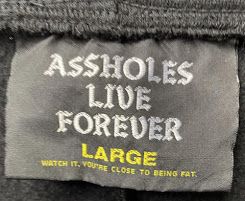Despite the Supreme Court's ruling in Iancu v. Brunetti, deeming the "scandalous and immoral" provision of Section 2(a) unconstitutional, your run-of-the mill obscenities are going to face a difficult hurdle to registration: failure-to-function. Mr. Brunetti himself found that out last year when his attempt to register "FUCK" failed to clear that hurdle. [TTABlogged here]. Kirill's Big Brain, LLC met the same fate in its attempt to register ASSHOLES LIVE FOREVER for a potpourri of goods in 14 classes, including air fragrance preparations, jewelry, clothing, and bath mats. The evidence submitted by Examining Attorney Jacob Vigil showed "wide-spread third-party use of the proposed mark generally as an expression and in an ornamental manner on goods the same as and similar to those identified in the involved application." In re Kirill's Big Brain, LLC, Serial No. 90033810 (January 6, 2022) [not precedential] (Opinion by Judge Christen M. English).

Relying on a string of TTAB precedents, the Board observed that informational matter fails to function as a trademark if it comprises a common term or phrase that consumers are accustomed to see in use by various sources to convey ordinary, familiar, or generally understood concepts or sentiments, rather than serving as a source indicator. The key question is, of course, how the consumer perceives the proposed mark.
The Examining Attorney provided more than 30 examples of third-party use of the phrase ASSHOLES LIVE FOREVER on such items as clothing, home décor, stickers, cell phone cases, drinking glasses, bottles, and mugs. The record also included use of the phrase other than in connection with goods included in the subject application: for example, media articles, social media posts, and podcasts.
Applicant Kirill's challenged the very nature of the failure-to-function refusal, contending that it is "paying the price for an unintended but arguably unfair overzealous application of flawed analysis." The Board, however, rejected the argument that the failute-to-function refusal is arbitrary or unfair. As it recently explained in the "FUCK" case:
Turning to the substance of the refusal, the Board observed that Kirill's prominently displays the proposed mark as an "adornment on many of the identified goods. "The placement, size, and dominance of the expression ASSHOLES LIVE FOREVER on Applicant's goods is consistent with conveying a common sentiment rather than signifying a brand or indicating a source." The Board acknowledged that Kirill's uses the phrase in a trademark manner on some of its specimens of use, but that alone does not negate the failure-to-function refusal.

The Board concluded that the Examining Attorney established "a reasonable predicate, i.e., a prima facie case, that ASSHOLES LIVE FOREVER is a widely used message that consumers are accustomed to seeing displayed in a non-source identifying manner on a number of different goods such that the proposed mark fails to serve a source-identifying function for Applicant's goods."
Skirill's argued that the refusal is improper because ASSHOLES LIVE FOREVER does not convey information, but the Board pointed out that "merely informational matter" includes 'widely-used common place terms and expressions' regardless of the specific nature of the message conveyed." "[W]idespread use of a term or phrase may be enough to render it incapable of functioning as a trademark, regardless of the type of message."
Skirill's further argued that the third-party uses are irrelevant because they post-date its first use of the mark, and thus those uses constitute infringement of Skirill's mark. The Board, however, found Skirill's evidence to be insufficient: "we find that Applicant has not proven that it made prominent use of its mark before the third-party uses arose such that we can conclude the third-parties are infringers and did not independently adopt the use of 'assholes live forever' or adopted the phrase to tread on any trademark rights of Applicant." Moreover, there was no evidence that Skirill's made any effort to police its purported mark. "Without such evidence, we must presume that the third party uses are still in the marketplace and are part of the environment in which relevant consumers will encounter Applicant's mark."
Finally, the Board observed that third-party registrations for such marks as HEROES LIVE FOREVER or LOVE LIVES FOREVER were not probative. They may show that "LIVE FOREVER" marks are not inherently unregistrable, but there was no evidence that "consumers regularly encounter these [third-party marks] used in the same way as the mark in question, namely, as an expression that is commonly used as such on a wide variety of goods." Furthermore, each case must be decided on its own evidentiary record.
And so, the Board affirmed the refusal
The content of this article is intended to provide a general guide to the subject matter. Specialist advice should be sought about your specific circumstances.

